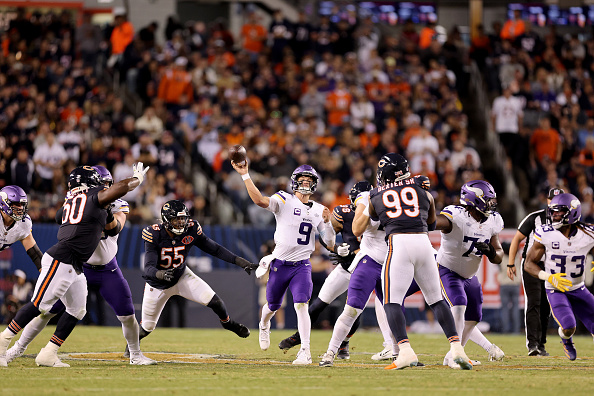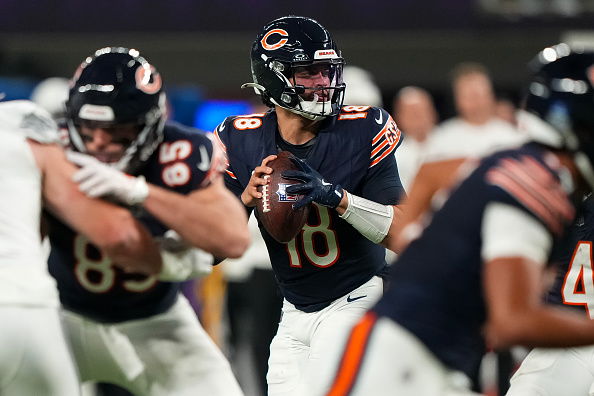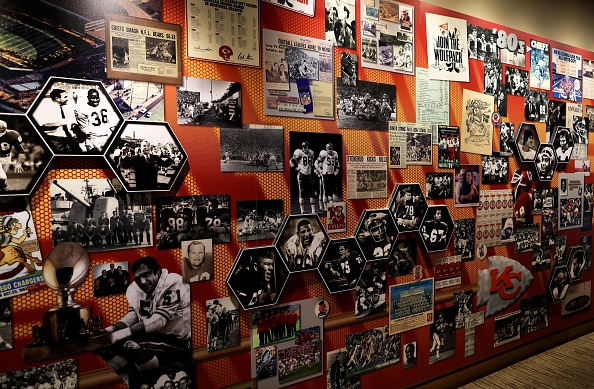As sports fans, we love to idolize the games’ superstars whose lives we all wish we had. Millions of young athletes tossing around in their backyards dream about becoming legends like Tom Brady, Joe Montana or Peyton Manning. Others may hope to one day have the fame and swagger of Cam Newton or Baker Mayfield.
Regardless of your quarterbacking preference, I’m sure most of those kids out there don’t have dreams of being Kirk Cousins. That dorky-looking guy known for giving uninspiring pregame speeches and yelling “YOU LIKE THAT?!” while adding just enough of a voice crack to make everyone uncomfortable. He’s probably not the guy that you get excited over being the starting quarterback of your team, but he gets the job done.
When Kirk Cousins became the NFL’s premier free agent last spring, I, among many others, questioned whether or not he was worth the approximate $28 million per year he was about to receive. You and I can debate all day long for whether or not he was deserving of the hefty contract, but most would probably agree that Cousins’ pay didn’t quite match his play this past season.
The purpose of this article isn’t to compare Minnesota’s quarterback to his inheritance. We need to isolate Cousins’ performance on the field from the rest of the Vikings roster and determine why this team really fell short of expectations.
Let’s analyze.
It doesn’t matter what the guy is getting paid. That doesn’t change the player we’ve seen in the past and it shouldn’t change how much we’re expecting out of the guy either. Kirk Cousins produced exactly how we all should’ve expected him to: slightly above average.
It’s not difficult to tell why Vikings fans were largely disappointed by the season’s result. It makes sense as for why most were appalled by his play; if elite-level money is being distributed, then elite-level play should be returned, right? They were so close to the Super Bowl with Case Keenum running the show, and certainly Cousins is enough of an upgrade to get us there, right? There’s a lot more that goes into a season than just that.
Defensive Regression
Let’s take a step back from the quarterback play and look at one of the biggest causes of decline. The defense was nowhere even close to the level of play shown in 2017, and this was the team’s largest drop-off between the two seasons. If you read my piece on the Chicago Bears from Sunday, you may now realize we should’ve expected regression of this side of the ball. Just to reiterate, elite defenses almost always fall back to their mean in the following year. It’s so unrealistically difficult to replicate that same type of dominance over a two-year span; we can’t expect players to come together at their highest level of play in consecutive years.
Looking at 2017, Mike Zimmer’s unit was statistically one of the best third-down defenses of all time. Their ability to defend the sticks and win time-of-possession gave the offense many more opportunities to win the game. Intriguingly, this was actually a red flag going into 2018, which may go against your intuition. This metric is very unpredictable and borderline impossible to sustain over the course of a season, making regression essentially inevitable. Among plenty of other variables, the defense was bound to be worse in 2018.
The Stars Didn’t Align This Year
I think we tend to forget about Everson Griffen’s situation. The team’s fiercest pass rusher was missing for a portion of last year due to mental health reasons, and he never seemed the same when he returned. It’s not necessary to dive into what he dealt with off the field, but when one of your best players isn’t with you on five different Sundays, it’s going to make a difference. Griffen was evidently worse when he returned to the field and it left Danielle Hunter with an increased workload. While Hunter stepped up admirably, having two is certainly better than having one.
From a pass coverage standpoint, the group was also noticeably worse. This, again, should’ve been expected. Harrison Smith was undeniably fantastic in 2017, earning First Team All-Pro honors, but something has felt missing from him ever since his disastrous NFC title game. The cornerback position is an underrated weak spot for Minnesota. Xavier Rhodes continues to be severely overrated by the public, but his shortcomings were more evident in 2018. Even head coach Mike Zimmer told media outlets that Rhodes needs to step up, inferring the veteran cornerback hadn’t been living up to his contract. The absence of Terence Newman is often forgotten about, and Trae Waynes has yet to make a consistently meaningful impact on this secondary.
You may have noticed how many times I have used the word “worse” to describe the intricacies of the Vikings’ defense. If Minnesota is looking for a place to improve in 2019, they can’t just expect more than what Kirk Cousins already is. The defense absolutely has to inch closer to their previous form.
Lack of Help on Offense
Rest in peace to Tony Sporano, one of the NFL’s long time offensive line gurus. The former head coach had been in control of the Vikings dismantled starting five before passing away last offseason, which I’m sure had some impact on the unit’s play. I don’t really have a way to quantify the impact of a positional coach, but I’d be hard pressed to believe it didn’t make a difference.
On the subject of pass protection, it was atrocious in 2018. Saying the Vikings sported two starting-caliber offensive linemen might be an overzealous statement. The addition of Garrett Bradbury should help patch together the porous interior, but the bank-breaking quarterback isn’t exactly evasive enough to hide their inefficiencies.
In comparison to his 2016 season (his best year in my opinion), Cousins faced pressure on 39% of his dropbacks, which was 7% higher than his ’16 campaign (PFF). Given the known volatility of quarterback play under pressure, it was tough to even fairly evaluate Cousins at times.
Even as an advocate against the running game in today’s NFL, I think the injury to Dalvin Cook had an impact on the effectiveness of Minnesota’s offense. That’s not to say it damaged the performance of Captain Kirk, but the offense as a whole could’ve benefitted from a more potent rushing attack.
Cousins Evaluation
None of this is to say Kirk Cousins played great last year; obviously the man has some faults to his game. With that said, I think the former Washington quarterback has received enough hate to reach underrated status.
Cousins had one of the best seasons of his career in 2018, and it’s a shame that he gets thrown under the bus for it. Minnesota’s previous successes carried a little too much weight in the public eye, but I think there’s more context to what happened. Remember in 2016 when Sam Bradford had certainly the best campaign of his entire career? That time when he set the NFL record for completion percentage, set a career high for passing yards, touchdowns, and a career low for interceptions? Or how about in 2017, when Case Keenum played out of his mind, outdoing what Sam Bradford did and topping any of his own previous outings?
I think it’s fair to say that the phenomenal single-seasons by previous signal callers made the Vikings look like a better team than they actually are. This was one of the primary causes of some misleading information, leading to lofty expectations.
I’m not typically one to use box score stats to evaluate players, but you can’t just brush 4,300 passing yards under the table. Cousins was able to obtain a passer rating of 108.5 from a clean pocket, which was 5.4 points higher than league average; under pressure he reached 83.1, which was 16 points higher than the mean (PFF). To go along with all this, a 3:1 touchdown-to-interception ratio is something to be proud of at the game’s highest level. Just from the basic numbers, we’d probably say Cousins was a good quarterback in 2018, but let’s continue.
Accuracy On-Point
Pro Football Focus has done a lot of fantastic work with ball location charting, and I was able to pull out some impressive accuracy figures from the Vikings quarterback.
Cousins ranked fourth in what’s defined as the most stable metric, limiting uncatchable throws. While ranking 15th in accuracy on throws to wide open receivers, he ranked in the top seven in both throws to receivers with one step of separation and throws into tight windows. I think the numbers say enough about the signal callers’ accuracy: it’s pretty good.
Cousins was also above average in accuracy to his first read, but his EPA per play (estimated points added) on those throws ranked 26th in the league. How much field position a team gained is a big factor when determining EPA, which leads me to believe he’s just not pushing the ball downfield enough. I think a lot of that is derived from play calling and scheme, which will be evaluated in a moment.
Accuracy is the best measurement of how good a quarterback is, and it’s clearly not much of an issue for Cousins.
No Help From Offensive Coordinators
The value of a good offensive play caller goes unnoticed too often. We’ve seen the impact that someone like Sean McVay, Andy Reid or Bruce Arians can make for a quarterback; Cousins certainly didn’t have that luxury.
One of the underrated aspects of the Vikings’ 2017 playoff run was the offensive scheme Pat Shurmur strung together. As football fans, most of us know that Case Keenum isn’t anything to get excited over. Shurmur was a huge reason for his borderline unfathomable production, creating a ton of open throws for Keenum to succeed. The lack of creativity from new offensive coordinator John DeFilippo was evident given his midseason firing and I believe we would’ve seen more consistency from the offense with a high quality play caller.
When the aforementioned DeFilippo was DeFlipped out of Minnesota midseason, Kevin Stefanski came in with the hopes of breathing new life into the offense. There were two differences that could be noticed between the two offenses.
The good news was the clear improvement of the running game. Dalvin Cook’s first half of the season versus the end was night and day and the revamped rushing attack was hopefully what the offense needed to supplement Cousins.
The bad news is how much Stefanski held Cousins back. As football fans, we all fear our quarterbacks becoming “Charlie Checkdown.” It’s a boring style of play, but most of all it alters how much of an impact the QB is able to make to his team’s chances of winning. In the first half of the season, Cousins was noticeably more daring in his approach to games. Although it occasionally caused more errant and intercept-able balls, it allowed him to using his two best weapons to their maximum ability. When the change at offensive coordinator happened, Cousins became way too conservative.
Adam Thielen and Stefon Diggs are fantastic downfield threats that need to be utilized as so. Stefanski’s more cautionary offensive approach limited the league’s best wideout duo from fulfilling their potential and it damaged the offense as a collective group. When you have a pairing like Thielen and Diggs, you absolutely have to build your offense around their strengths. Just as DeFilippo struggled with creativity and the running game, Stefanski straight up limited the impact that Cousins and his dangerous duo could have.
2019 Kirk Cousins Preview
The NFC North is arguably the toughest division in football right now, but I like Minnesota to come out on top.
As mentioned earlier from my Bears piece, Chicago outperformed themselves in 2018 and there will likely be a steep regression from Matt Nagy’s squad. Aaron Rodgers should never be counted out and while I expect the Packers to improve, Minnesota’s roster is unequivocally stronger than Green Bay’s.
I’m expecting the defense to middle out somewhere between the 2018 and 2017 performances. With a secondary that I predict to play much stronger and a return from Everson Griffen, it’d be surprising to see them not be a little better.
The offensive line can’t go anywhere but up from here. From the addition of first-round selection Garrett Bradbury and another year of experience from Brian O’Neill, it’d be tough for them to be any worse. All quarterbacks play better when the offensive line plays better, so an improvement here should make a difference for Cousins.
His ability to avoid making bad plays will take the offense a distance, but they won’t be able to reach their full potential without unleashing more confident throws to his coveted duo out wide. A lot of this will be predicated on the offensive coordinator, and a full offseason within the scheme could be all Cousins needs to improve.
Kirk Cousins obviously isn’t an elite quarterback, and he probably never will be. And to be quite honest, he’ll probably never live up to the money he’s been gifted by Minnesota’s front office. That being said, if he’s able to balance out his solid accuracy and move it down the field more, this offense is going to be just fine.
Even with Kirk Cousins at the helm, the Minnesota Vikings should be favorites to win the NFC North.






